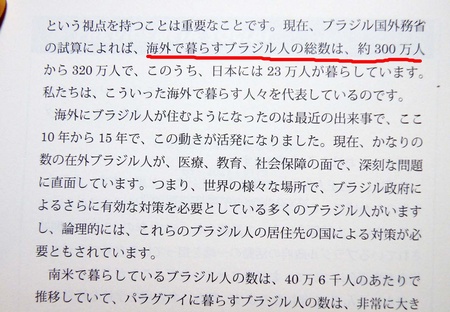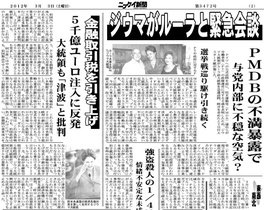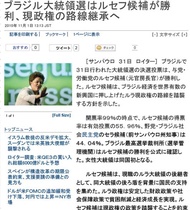Even the spelling of the president's name is different
Naturally, there are differences between the way personal names are written in the Japanese media and the way they are written in Japanese-language newspapers in Brazil.
For example, former President Dilma, who was impeached at the end of August 2016, is referred to as "President Rousseff" in Japan.
We believe that since the Brazilian media normally refers to her as "presidente Dilma," translating it directly into Japanese would be closer to the local sensibility.
However, in Japan, the practice is to use surnames, so it goes without saying that we don't refer to him as "Prime Minister Shinzo."
But for those living in Brazil, "President Rousseff" seems a bit strange.
Curiously, the president of Brazil has different spellings for his first and last name.
- "President Corol (Fernando Corol)" is written with his surname. For some reason, in Japan, it is written as "Fernando Corol", which is different from the Japanese pronunciation.
- President Cardoso (Fernando Henrique Cardoso) is also written by his surname. In Japan, it is written the same way as "President Cardoso".
- President Lula (Luis Inacio Lula da Silva) is written by his surname. In Japan, he is often written as "President Lula."
People living here are directly influenced by Brazilian expressions when watching Brazilian television. The Japanese spoken by the second and third generation Japanese, who are close to us, uses expressions directly from the Brazilian media, and is heavily influenced by "Brazilian writing."
In addition, the soccer player "Jikko" is pronounced "Zico" in Japan.
In this way, the Japanese language used in Brazilian Japanese communities is already different from that used in Japan, even when we look at proper nouns alone. Although it is a Japanese expression, it is a Japanese expression with a Brazilian sensibility and sense, and is becoming "Brazilian Japanese."
Japanese expressions for the continent
Although Colonia is a Japanese expression, it is a kind of "continental Japanese" that is somehow infused with Brazilian sensibility and sensibility.
This has been exposed to Japanese readers not only through the Nikkei Shimbun website, but also through Yahoo! News, Gunosy, and other outlets for which the Nikkei Shimbun provides articles, and they have been posting a stream of responses such as, "What country is Brazil? Is this a newspaper from the Taisho era?", "What is the Sacred Province?", and "What does the "re" in 15 re?" (an abbreviation for the currency unit real)
This trend was especially noticeable during the Rio Olympics, when attention was focused on Brazil. Two Nikkei Shimbun articles published on Yahoo! News had over 360,000 views. There were more than 10 articles with over 20,000 views. An article from a Japanese language newspaper with a print edition of only 10,000 copies was seen by 360,000 Japanese people online. This is an unprecedented and abnormal situation.
Most Yahoo readers start reading our article thinking it is a Japanese publication because it is in Japanese, and then seem to be taken aback by the colonial expressions that appear here and there.
We want people to read the content of our articles, and it would be a problem if they were to feel uncomfortable with the level of expression and not read them. As a result, starting this year, we have gradually begun to use Japanese-style notation for the text we post online.
What do you mean by "overseas"?
On the other hand, when I first came to Brazil, I was surprised to see the expression "arquipélago (islands)" in an article about Japan in a local newspaper. I am from Shizuoka Prefecture, but people from Honshu generally do not think of themselves as "living on an island." Perhaps the same is true for Hokkaido, Shikoku, and Kyushu.
Most Japanese people use self-deprecating expressions like "island mentality" when speaking, but I realized that the reality is that few people are actually aware that they "live on an island."
The word that bothers me the most in terms of its subtle discrepancy with Japanese is, without a doubt, "overseas." The hopeless island feeling that this word evokes is something that always troubles me.
For example, in a translated article on the Brazilian domestic page, there is a sentence titled "Brazilians are becoming more and more interested in traveling abroad," and upon closer inspection, Argentina and Chile are listed as destinations. If you think about it literally, Europe is "overseas" because it is across the Atlantic Ocean, but Argentina and Chile, as well as North America, are also part of the country.
In other words, the word "overseas" is associated with the island mentality of "the other side of the sea is a foreign country," an expression that does not fit a continent with neighboring countries connected by land.
Once you notice this sense of incongruity, it starts to bother you about all the writings written by Japanese people in Japan.
For example, reports on the global financial situation by Japanese banks and securities companies, as well as articles by correspondents in national newspapers, often contain expressions such as "Germany being influenced by overseas influences," which feels quite strange to me as a reporter for a Japanese-language newspaper.

At Nikkei Shimbun, we try to use the words "overseas" or "foreign" whenever possible. When we use the word "overseas" in our newspaper, we mean "overseas from the Japanese perspective." The idea that "outside the sea = foreign country" is deeply ingrained in the Japanese language. The main reason for this is probably that Japanese is not used as a daily language outside of Japan.
It may be just sour grapes from a Japanese-language newspaper reporter, who is like a frog in a little well, to imagine that if this sensibility of "continental Japanese" were to be fed back to the home country someday, it might be a step toward more "global Japanese."
© 2017 Masayuki Fukasawa







